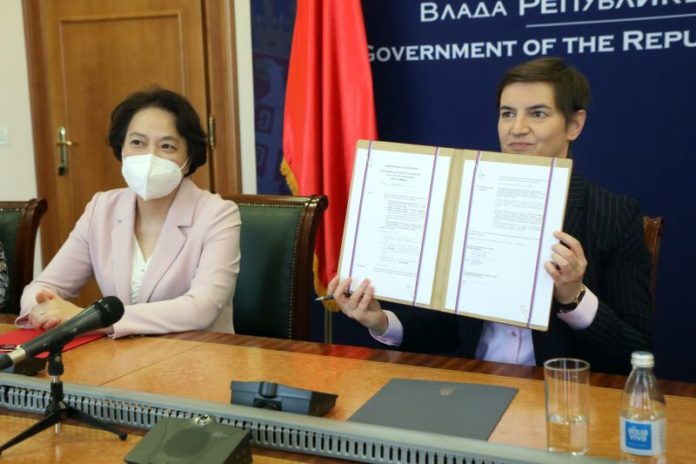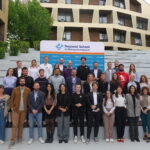By Stefan Vladisavljev and Vuk Vuksanovic
Chinese vaccine manufacturer Sinopharm does not exactly have a stellar market reputation these days.
The two Chinese vaccines Sinopharm and Sinovac have both been approved by the World Health Organization (WHO) for emergency use, and both are likewise included in the global vaccine sharing scheme COVAX. Still, countries where Chinese vaccines are widely used, like Bahrain, Mongolia, Seychelles, and Chile, already saw surges in COVID-19 infections despite widespread inoculation. The Delta variant of the COVID-19 virus is complicating things because Chinese vaccines, while they appear to be working against this variant, appear to be less effective than other vaccines.
In fact, many Asian countries, such as Malaysia, Indonesia, and Thailand, are experiencing the exact same troubles. A Hungarian medical study established that the Sinopharm vaccine is ineffective in a quarter of people over the age of 60, leading to worries about a rebound in infections.
However, in one country, Sinopharm’s business is set to boom – Serbia.
In March 2021, plans were announced to construct a Sinopharm vaccine production facility on Serbian soil with financing from China and the UAE. A trilateral memorandum of understanding on establishing the production facility was signed in July 2021. On September 6, 2020, Serbian Health Minister Zlatibor Lončar told the public that the construction of the factory would start in a few days. According to Lončar, the construction will be completed in the first quarter of 2022, and the factory will produce about 3 million doses per month. Why is Sinopharm doing so good in Serbia right now?
Converging Interests
Above all, there is a confluence of interests between Beijing and Belgrade.
Primarily, Beijing sees Serbia as a springboard to penetrate new markets. Ideally, China would first enter into Serbia’s immediate neighborhood in Southeast Europe and then launch from this staging point into the EU. This pattern is already present with Chinese construction companies, tech companies, and the defense industry. A trial manufacturing of vaccines will be done on the premises of Serbian pharmaceuticals company Hemofarm, which is owned by the German Stada Group, giving Sinopharm a potential shortcut to the EU.
The production of the Chinese vaccine in Serbia can be seen as a ‘natural continuation’ of the alignment of the two countries in the fight against COVID-19. It started at the very outbreak of the pandemic in Serbia when China was presented as the only country that could provide medical assistance to Serbia in the fight against the virus. It continued with the construction of the Chinese Fire Eye testing laboratories in several Serbian cities. Collaboration reached its peak at the beginning of the vaccination process with more than four million Sinopharm vaccines purchased from China.
Yet, Serbia is not the only country in Eastern Europe looking to expand its cooperation with the Chinese pharmaceutical giant. In neighboring Hungary, Sinopharm production is planned to begin in late 2022, which will secure Sinopharm’s ‘Made in EU’ label. Serbia expects to become a regional supply hub for the vaccines, particularly since in June 2021, production of the Russian Sputnik V vaccine began in Serbia.
“These doses will be intended primarily for the citizens of Serbia,” Health Minister Lončar openly stated. “If there is a surplus, [they will be used] for exports to the region.”
A strong indication of Serbian ambition was seen earlier this year when Serbia exercised its own vaccine diplomacy in the Balkans by donating vaccines to its neighbors, in North Macedonia, Montenegro, and Bosnia and Herzegovina. During that period, Serbia also allowed foreigners, primarily from the Balkans, to come to Serbia for inoculation. Now, Serbian vaccine diplomacy transcends the region, as just in Africa, Serbia donated over 200,000 vaccine doses. Serbia can donate vaccines both regionally and globally because Sinopharm gives it a surplus of vaccines from non-Chinese manufacturers. That way, Serbia buys political prestige and secures the key goal of preventing new recognitions of Kosovo.
For Serbia, there are other reasons closer to home why betting on Sinopharm makes sense. One of them is the need to secure supplies for future deterioration of the pandemic situation as the COVID-19 turmoil is far from over in Serbia. When Serbia originally started receiving Sinopharm vaccines from China in January 2021, the mortality ratio in Serbia was at 1.01 percent. However, the fatality rate among medical staff was high as 72 doctors have died compared to 43 in the United Kingdom, depleting the country’s over-stretched health system. At one point, Serbia had the second-fastest vaccination rate in Europe after the UK. Now, thanks to the anti-vaccination mood among the youth, the EU completely outperformed Serbia in vaccination rollout. For Serbs between the ages of 18 and 30, the vaccination rate is 18.4 percent, compared to around 70 percent among Serbs older than 65 years. In August 2021, 49 percent of the population had received one dose of the vaccine.
The infection and mortality rate is expected to grow. The US Embassy in Serbia raised Serbia’s risk level to Level 3 and advised US citizens to reconsider visiting Serbia. More importantly for Belgrade, Serbia has been taken off the EU’s free travel green list. It remains unclear how much this unfavorable health situation results from the use of the Sinopharm vaccine. Sinopharm has the highest share of vaccinations with 4.2 million doses acquired up to date. However, as there is no end to the pandemic woes in sight for Serbia, it cannot discount Sinopharm and wants to ensure that it always has an ample reserve.
Inoculating the Economy
Even with the vaccination process slowed down and the number of COVID-19 cases increasing, Serbian officials took a firm stance that COVID-19 prevention measures should be implemented with the preservation of the Serbian economy in mind. President Aleksandar Vučić stated that his “conscience is clear when it comes to the fight against the pandemic,” and that he has asked the medical part of the crisis staff to consider the economic situation as well. Serbia chose an approach that will focus on promoting the vaccination program while imposing few to no restrictions. As a result, vaccine accessibility is critical to ensuring the long-term viability of this strategy.
The fact that Serbia, a country of approximately seven million people, will produce more than 30 million Chinese vaccines provides an opportunity to establish a completely new branch of the economy, namely vaccine export. With its own vaccine diplomacy, Serbia established vaccine distribution routes, primarily in developing countries and the Western Balkan region. Now, with the help of the Chinese vaccine, Serbia can move from the role of re-distributor to the position of direct seller.
Ultimately, domestic political marketing lurks behind every action of the Serbian leadership. Namely, by aggrandizing ties with China, Serbian elites promote themselves to the public as enablers of a fruitful partnership and breadwinners of big Chinese capital inflows. The vaccine procurement fits into that same rubric.
Thanks to the pro-Chinese narrative pushed by the Serbian leadership in the media and public domain, two-thirds of Serbian citizens believe vaccines from Russia and China are more reliable than those from Western manufacturers. Even the groundbreaking for construction of the Sinopharm production factory in Serbia provided an additional example of this narrative foisted on the public by Serbian authorities. President Vučić was present to cut the ribbon, with the cameras rolling to capture his proclamation that he will take the Chinese vaccine as the third booster dose.
Despite the controversies surrounding Sinopharm vaccines, its success in Serbia is primarily owed to Serbian leadership simply willing it to succeed. Still, despite the will of Serbia’s most powerful politicians, the extent to which the new factory will aid the country in its struggle against COVID-19 remains to be seen. What is in little doubt is the fact that Sinopharm’s management are rubbing their hands together in self-satisfaction.
Vuk Vuksanovic is a PhD researcher in international relations at the London School of Economics and Political Science (LSE), an associate of LSE IDEAS, LSE’s foreign policy think tank, and a researcher at the Belgrade Centre for Security Policy (BCSP).
Stefan Vladisavljev is a Program Coordinator at the Belgrade Fund for Political Excellence and a member of the organisation team of the Belgrade Security Forum.
China Observers in Central and Eastern Europe (CHOICE) is a multinational consortium of experts providing informed analysis on the rising influence of the People’s Republic of China in Central and Eastern Europe (CEE).













